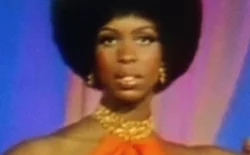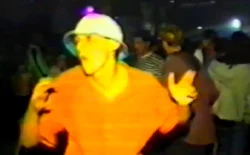Crate-digging DJ Jeremy Fichon, aka Jeremy Underground, prides himself on playing some of the rarest white elephants in house music history.
But unlike many other deep-digging DJs, he’s transparent about the way he goes about finding tracks. Whether it’s via YouTube, eBay or Discogs, the usual stigma around online searching rather than “real life” digging doesn’t apply. It’s simply all about the tunes, and he’ll go to serious lengths to acquire them – the obscure selections he plays are the cornerstone of his reputation as a selector.
My Love Is Underground, the Paris-based collective he’s part of, includes similarly well-regarded artists such as Brawther and SE62, and the MLIU name is also shared by two impressive compilations, the most recent of which dropped in February. As a DJ he’s risen to prominence in recent years thanks to the wave of house mania that’s swept the UK, Europe and further afield as a younger generation of clubbers embrace a sound that’s almost 30 years old.
Ahead of his appearance at Hertfordshire’s Farr Festival this July, FACT’s Nick Wilson sat down with Fichon for a lengthy conversation about his career as a DJ, how Beatport changed the definition of “deep house”, why he still idolises Kerri Chandler, and how much is too much to spend on a single record.
I think we should start by talking about how you started all this – and I know you’ve probably told this story many times – but the way you got into house music is pretty interesting.
Oh, sure, I’ve told it millions of times but it’s good to tell it. I started really early, I got into quality underground house music in 1997. I was 10 years old, listening to Radio Nova in Paris – it’s a really good FM station there. DJ Deep was the proper ambassador for house and techno back then in the ‘90s in Paris, and especially for New York house, he was an ambassador of that sound, things like Kerri Chandler and Masters At Work.
So I was listening to that radio show as a kid, I have very fond memories of that. I can remember hearing him play Charles McDougald’s ‘That’s Life’ for the first time, it’s a record that is Kerri Chandler-related, New Jersey based. And that was the track that changed my life, basically. That was the track that had me going, “What is this record? I need to get this!” So I got my mum to take me to Rough Trade in Paris, and there I was as a 10-year-old looking up at all these tall guys buying records like, “This is magic! When I get older I wanna be like these guys!” And eventually it happened.
It’s interesting that you mention 1997, ‘cause I reckon that’s the year I first got into house, and many others did too, thanks to Daft Punk’s Homework. There must have been some amazing energy in Paris at the time.
Yeah, I remember listening to that album, I remember really liking it and hearing it on the radio. But like I said, the real turning point for me was the year after, taping those DJ Deep shows off Radio Nova on Saturday nights. You have to remember though, I was far too young to go out at the time the scene was great. I first went out in 2002, to see Kerri Chandler, a very important character in my house education. It’s ironic really, ‘cause by the time I could actually go out, a lot of the energy you mention had gone away and it wasn’t so good in Paris any more, in the early 2000s – in fact it was probably the worst time! But since then it’s got much better, especially recently, so I can’t complain.
How do you think Paris has changed? I remember people telling me in the early 2000s that Paris was one of the worst places to play, apart from Rex Club and a few others, but it feels like it’s having a real renaissance in the last few years
Oh wow, well, brand new clubs, brand new record shops, it’s super nice, really getting there. I’m so happy about Paris now. It’s had an impact on the whole of France as well, you can play killer gigs pretty much everywhere now, even in the countryside. Marseille, Nantes, Lyon – I really like the energy in France now. I always used to say that the UK was my favourite place to play, but I think actually my favourite is France these days.
“The East Coast sound of house was my musical education”
You mentioned Charles McDougald and you used the expression “New Jersey based”. I think if someone was to categorise what you play, there is a certain sound you go for that is synonymous with Kerri Chandler, Shelter and things like that – but a very stripped down take on it. Would you say you play “New Jersey” house?
Yeah, I think we should definitely discuss this, ‘cause New Jersey is in one way a good name for it. I’ve always used the terms “New York house” or “New Jersey house”, meaning tracks like the ones Kerri Chandler plays, but if you ask someone older to define that, they will probably take “New Jersey” to mean things that are soulful, church-y, very gospel sounding, like…
The music Tony Humphries used to play at Zanzibar?
Yeah, definitely, and let’s be clear, I’m into all that Tony Humphries kinda stuff as well. But I’m just very into this very specific style, I suppose you could term it the “Kerri Chandler dub style” or something like that. That’s precisely what I’m talking about when I say “New Jersey house”. I prefer the East Coast sound of house. That was my musical education, Blaze and Masters At Work, much more than [Chicago’s] Trax Records or [Detroit’s] Derrick May, and I’ve always been that way. I also never felt like that [East Coast] type of music was particularly popular with the younger generation either. It was always Detroit that was trendy with young European music fans. So I guess that’s what I enjoy coming out and representing for New York house.
The tracks on your latest compilation, My Love Is Underground 2, share a similar ethos.
In terms of the compilation, I’m not sure I would say that is Jersey house necessarily. It’s just raw house I’m enjoying playing. Names don’t really matter. Raw, soulful in a way, even though there’s not a lot of sounds going on all the time, very stripped down.
“That feeling I get when I discover a killer tune is pretty unique”
I suppose “New Jersey” as a term doesn’t fit with a track like Mind Chime’s ‘Disco Boogie’ (Tokyo Dub Mix) – presumably that’s a spaced-out Japanese take on the same style?
No, those guys are from Nottingham – British guys! In fact, thinking about it, a third of the compilation is from the UK. It’s a compilation of songs inspired by Jersey house, I guess. And that’s what makes it interesting, and partly the point of it as well – of course there were great Jersey-esque house tracks made in the UK. It’s not even UK garage, it’s earlier than that! I really enjoy all those UK releases.
How did you get into this level of detail when it comes to this style of music? It feels as though you have a very sharp ear for a certain kind of record.
It’s all about curiosity. I’ve always been curious about music and I always want to dig deeper. You discover someone, you dig through his whole discography. I may have started with house as a kid, but 10 years later I’ve opened up my musical spectrum a lot more and it never ends, the quest is every day. Of course I make a living doing that nowadays, playing these tracks to audiences, but I reckon that even if I wasn’t a DJ I would still be digging in this way, on the internet and buying records – it’s very natural to me. That feeling you get when you discover a killer tune, of course there are beautiful things in life like love, sex, friendship or whatever, but that feeling I get when I discover a killer tune is pretty unique. I just know I’ll be on this quest for my whole life, on Discogs or YouTube looking for tunes. Or at the record shop.
It sounds like YouTube and Discogs come more naturally to you than the record shop.
I’m not really the perfect old school record digger, digging down the record shop. Most of the records I buy I get from Discogs and eBay. Because of many reasons, but just ‘cause I find it hard to find really good record shops where I can actually find the stuff that blows my mind, and in good condition. Pretty often I’m like, “I want that record, it’s there for sale, I’ll get it.” And at the end of the month, I count the money and I’m like, “Okay, I’m out of budget,” so I’m not gonna go to the record shop after that! When I travel, if there’s a killer shop, then of course [I’ll go in]. But I would say that 90% of everything I buy is thanks to the internet. I feel like I’m still contributing to keeping that secondhand pool alive – when I buy on Discogs, I’m still buying from shops, so it’s basically the same process.
What do you make of the recent reissue boom? There were a few stories circulating last year that suggested that it was a bumper year for reissues. It certainly feels at times that you go to the record shop and see row after row of house reissues, some of which really aren’t that expensive to obtain on the internet.
I get it. I don’t wanna be too negative really. If there are reissues that are popular, it suggests that maybe people aren’t getting excited with new music as much as they want to hear music from the past. But I dunno, it’s a tricky question. I don’t want to be too negative, ‘cause modern music is not that bad, you know? There is some good stuff, for sure. I have mixed opinions about it.
I’m not the guy to complain when I have an OG copy of something and it gets reissued. “Oh, why did you reissue this? I paid 70 euros!” That is the reason why most people complain, isn’t it? Why else would you complain about people being exposed to good music from the past? I want that! I want young and old to enjoy it! Of course, with the crazy amount of reissues that have been coming out the last couple of years, of course you can question why there are so many.
There’s been an awful lot of reissues in the style that I play, things from big labels from back then like Nitegrooves and so on. And for me the choice of these reissues is sometimes a bit questionable, that’s my personal opinion. I’ve seen a lot of New York house reissues and thought, this isn’t really the one I would have reissued, if I had access to a catalogue that large. Then you have things like the Dream 2 Science record on Rush Hour which we can all agree is amazing. No one knew that record and it’s incredible. So if you have an issue with a record like that, just fuck off, to be honest. Maybe that’s just my taste.
“The knowledge of the average clubber has got much higher”
Do you feel as though tastes have been changing? It definitely feels like young people are more into what you do now than they were some years ago.
Before I started touring, five years ago, I was really pessimistic about the feedback I would get from people, with the music I’m into. “No one understands this, no one will dance to it, they’re all stuck in minimal tech-house or whatever.” But then after years of touring and delivering a message of “Listen to this! Listen to this,” playing quality black music, quality soul, quality disco, quality grooves, right now that kind of music seems to be getting incredibly popular.
You see DJs like Motor City Drum Ensemble, who plays a lot of disco and he’s crazy popular, Hunee, who plays disco, house, switches up the styles, me playing my obscure early ‘90s stuff – we are all getting very popular in Europe. I’m really enjoying it, it’s amazing. Discogs, YouTube, all the channels on there have really helped educate and build the knowledge of young people, ‘cause right now they can discover anything if they’re curious. They don’t have to live in a big city. They don’t have to live close to a record shop. They can listen to mixes online, or dig through a very specific YouTube channel.
So I think the average knowledge of the average clubber has got much higher, and they have much higher expectations as well. You can’t just turn up and play a few classics and say, “There it is.” People expect far more from you. People expect crazy stuff now, I think that’s great. I’m very optimistic nowadays, so I’ve come full circle. More and more we all feel we can play whatever we want, whether in Paris or Berlin or Amsterdam, and the boundaries are coming down. You can be booked formally as a “house” DJ and play a bit of everything, UK garage, techno, disco. I don’t think that was possible 10 years ago. They expect that “digging” mentality now.
On a similar topic, I enjoy looking at that Facebook group The Identification of Music, ‘cause I can’t believe the records that people are trying to identify – it’s always very broad, from some weird soul track Floating Points is playing, to a classic someone recorded Motor City Drum Ensemble playing at a festival.
Yeah, we have the same in France, on the page for Weather Festival, the one that’s organised by the Concrete guys. It started as an ID group for the tracks people heard at the festival and it’s now global, and everyone’s posting tracks from any kind of party anywhere. And it’s really young too, the average age seems to be 20 years old or so, club kids. So I feel like I have to keep an eye on this ‘cause these are the people that hire me! These are my bosses, they come to my gigs. So I enjoy looking at that and keeping an eye on it. Not all the tracks, but I love the movement and that curiosity.
It’s funny ‘cause you see things like someone identifies something that MCDE is playing, and then you see the copies start flying out on Discogs, and it becomes an expensive record all of a sudden. The thing is, some people complain about that, but I think it’s great, that’s what I’ve always wanted to see. People getting into good music. How can you complain about that? I want the crowd that comes to see me to enjoy the songs I play and know them and get into them. That’s what we are about. Of course the majority of people go to a club to get high and get laid and have fun, so let’s not try to say it’s something it’s not. We’re talking about the 20% that really care, not those that just want to forget the week and get high.
“Real deep house is too intelligent for the people who use that expression”
Making a compilation like the latest one is very time consuming, and involves cold-calling a lot of artists and labels. Did you have any difficulties with that?
The funniest reaction was probably for The Unknown’s ‘Get On It’. It’s an early Derrick Carter production, from 1989, on a sublabel of Trax called Housetime Records. That’s one of his first aliases, The Unknown. Everybody knows the old stories of how Trax records was not the most legit label, with terrible pressings and often bad at paying artists and so on. Every house head knows this. Derrick Carter never got paid for it as far as I know – I’m not too sure I’m right about all the detail, but I’m fairly sure it was not a good deal for him, or anyone for that matter.
So anyway, I played with Derrick in May at his party in Chicago at the Smart Bar. I’m like, “Hi man, I’m Jeremy, and I’ve put one of your old tracks on my new compilation!” And he was like, “Oh, really.” Kinda pissed off to be honest, ‘cause he knew it was one of these old tracks he can’t do anything about. We licensed it from the current rights holders. So that was pretty weird, telling him I’ve put this old track on the compilation and I really hope you don’t mind! You’d hope that people would be happy but sometimes you’re taking people back to bad memories. Anyway the music’s great and I love the song, so that’s what matters. It’s one of the odd things about doing compilations in this style of music.
Do you think part of the charm of these old records is the methods that were used to make them? A lot of modern takes on house sound very flat and lifeless compared to the energy and warmth of these type of tracks.
You mean in terms of the process back then? I mean, I don’t know much. House in its traditional form, in its true form, is an old music style, we can’t hide the truth about that. It’s 30 years old or more. It’s not a young genre. The tracks I’ve picked out are more from the second wave of house music, or even the third wave.
If you consider the first wave was the mid ‘80s in Chicago, then the second wave was New York in the early ‘90s, and then it evolved in many different directions. What makes the tracks so special is that it’s a golden era for that music. The perfect time. I don’t have much input on the production side of things, it’s a long and complex topic and I’m not sure where to start. Right now people call a lot of music “house”, but I’m not so sure I agree with their definition any more – maybe this stuff should have another name, or new names should be created, like with bassline or dubstep or whatever, all these UK sounds. Perhaps we should see the old house music as more like disco, it’s an old thing that still lives because disco never dies.
It’s funny how we talk about ‘90s house but we never say ‘70s disco, we just say disco. I think about that one a lot! You never say “Red Greg is a ‘70s disco DJ” – of course not, he’s simply a disco DJ. I think house music should have a museum, just like the Submerge techno museum in Detroit. There should be proper academic, historical books about house music. We have enough critical distance to be able to evaluate it with the level of detail it really deserves, to analyse it. We don’t seem to have quite reached that point yet.
If we’re gonna talk misappropriation of the word “house”, maybe we should talk about everyone’s favourite term: “deep house”. I’ve no idea what that even means any more in the modern context.
Ah, yes. Well, to me that expression comes from Mr. Fingers. Proper “deep house”, that was how that was used when I was a kid, but it has nothing to do with the way people use that expression now. Deep house doesn’t really get played in clubs because real deep house is almost too deep for the club! I think the whole story about why Beatport started to categorise terrible music as “deep house” is because it’s always been an elitist thing. If you were into deep house in the ‘90s you were into a very specific style of music that was an elite thing. You were almost better, or perceived as better than someone playing something else. So that’s why I think they started bringing back that expression – it sounds good, it sounds intelligent. Real “deep house” is too intelligent for the people that tend to use the expression. Another pet theory of mine.
“No matter how big you are you should always give love to your fans, it will always come back to you”
Time to pin your colours to the mast, Jeremy – you’ve got some very rare, expensive records. What’s the most you’ve ever spent on a 12”?
Ah, man, I need to skip this question cause record collecting makes you take some questionable decisions in your life. And I made some very odd decisions over the years. So I’m going to go with, “way too much money”. Four figures, but just way too much. But then I sold that record straight afterwards, or a few months later, ‘cause I realised that’s just too much money for a record.
Here’s a funny story about a three-figure record instead, which was the first Kerri Chandler release ever, from 1989, ‘Super Lover’. It was on a private label from New Jersey called Express Records. So I always heard about it, and I used to ask people like DJ Deep, “Do you have this? What does it look like?” Because back then there was no Discogs. Then Discogs was invented, and it still wasn’t on there for years! So then I started to ask Kerri, and he didn’t give me any precise answers, so I thought, well, maybe this record simply doesn’t exist.
Then one day it popped up on eBay and I started bidding on it. It went for crazy money but I managed to win it. So I thought, “Wow, well, I’m happy to get it, but that was an awful lot of money.” And then a few years later I was chilling with Kerri backstage at DC10 in Ibiza, ‘cause we were playing there with Brawther, and I was talking to him about it. “Hey Kerri! So I finally bought that record on eBay, man.” And Kerri goes, “I was bidding on that record, I lost to some crazy guy on the internet!” And we realised I had outbid Kerri on his own record! [Laughs] And the irony for both of us was that when it finally appeared on Discogs, the price ended up being much, much lower. So there you go! Had I known Kerri didn’t have the record maybe things would have gone differently, but we had a good laugh about it in the end.
You talk about Kerri Chandler and DJ Deep lot – are you friends with any other house legends that you looked up to as a kid?
To be honest I’ve not really been in touch with that many of these legendary characters, ‘cause not all of them are that easy to approach. Not all of them are that interested in talking to young people, like the guy I was 10 years ago. But my number one musical legend of all time has always been Kerri and this guy is just the nicest guy on earth. He’s been a true inspiration to me, not just as a music producer but also as a human being.
I used to be one of those super fans, going to every show he played, travelling to see him play, and he was always the nicest person. Really caring, inviting me backstage for a drink, caring about his fans, and he has a lot of them, not just me. Seeing this gave me a lot of inspiration for my own career, like, this is the way it should be. No matter how big you are you should always give love to your fans, it will always come back to you. It’s a pity not everyone behaves in that manner, some people act like superstars.
Kerri always stays in touch, sends me “happy new year” text messages and things like that. How many numbers does that guy have on his phone? We haven’t seen each other in a couple of years but we still stay in touch. So I have a lot of respect for Mr. Chandler, his music changed my life. It’s all thanks to him and DJ Deep. No matter how big you get, always stay true to the fans and stay humble!
My Love Is Underground Vol 2 is out now on Favourite Records. Jeremy Underground plays Hertfordshire’s Farr Festival on July 13-15.










![Ryoji Ikeda installation data-cosm [n°1] extended at 180 Studios until 1 February, 2026](https://factmag-images.s3.amazonaws.com/wp-content/uploads/2025/12/data-cosm-ALubbock_180-14Oct-3554-250x155.webp)
![180 Studios presents new Ryoji Ikeda installation, data-cosm [n°1]](https://factmag-images.s3.amazonaws.com/wp-content/uploads/2025/10/ryoji-ikeda-data-cosm-1-250x155.webp)













